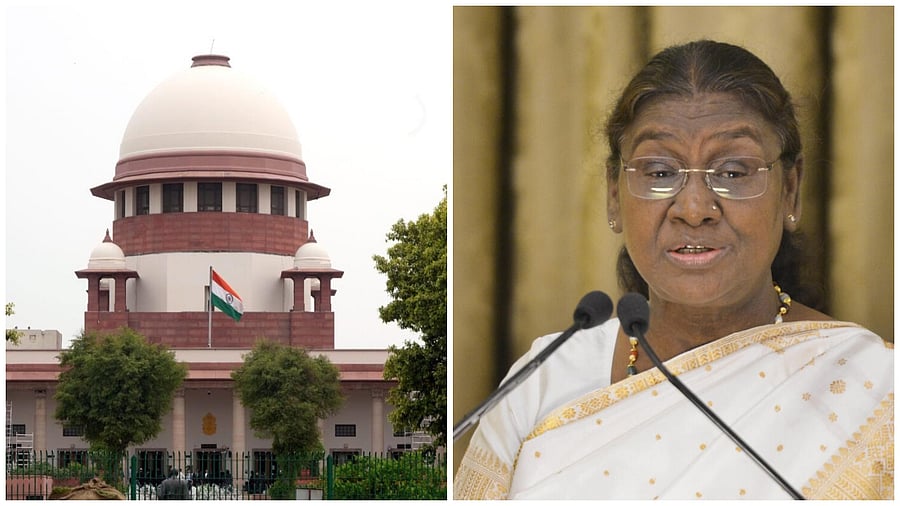
Supreme Court of India (L), President Droupadi Murmu
Credit: PTI Photos
New Delhi: The Supreme Court on Thursday held that no timeline can be fixed for the grant of assent for the Governor and the President, though the constitutional authorities cannot sit over bills passed by the State legislatures indefinitely.
A five-judge Constitution bench led by Chief Justice of India B R Gavai also declared that there is no concept of deemed consent in the Constitution.
Deemed assent is against the spirit of the Constitution and the doctrine of separation of power, it said.
"Articles 200 and 201 of the Constitution are framed to allow elasticity. The imposition of a timeline is strictly contrary to the Constitution. The concept of deemed assent presupposes that constitutional authority would place a substitute role for the Governor, it is antithetical to the separation of powers. We have no hesitation in concluding that deemed assent is virtually a takeover of functions of a constitutional authority," the bench declared.
The court also held that the discharge of the functions by the Governor or the President is not justiciable.
It emphasised judicial review can be invoked only when the bill has become a law.
The court also clarified that the President is not bound to seek review when the Bill is reserved by the Governor under Article 200.
"If in extraneous consideration, the President wants to seek, it can," the bench said.
The court further said, when the Governor chooses not to act, the constitutional courts can exercise judicial review.
"We can issue a limited direction to the Governor to act without observing anything on merit," the bench said.
The bench, also comprising Justices Surya Kant, Vikram Nath, P S Narasimha and Atul S Chandurkar, rendered the opinions on the Presidential reference made after the April 8 judgment by a two-judge bench in the case of Tamil Nadu.
President Droupadi Murmu had on May 13 made the reference to the Supreme Court whether timelines can be imposed on Governors and the President for granting assent to bills passed by State legislature.
The court had reserved its opinion on September 11, after 10 days of proceedings, wherein arguments were heard from the Centre, several State governments, political leaders, parties and others.
On April 8, the two-judge bench of Justices J B Pardiwala and R Mahadevan in the case of State of Tamil Nadu against the Governor of Tamil Nadu, held that the State Governor must act within three months if withholding assent or reserving a Bill, and within one month when a bill is re-enacted.
It also prescribed that the President should decide on the Bills reserved for her consideration by the Governor within three months from the date on which such a reference is received.
The court had also declared that the Tamil Nadu Governor’s decision to withhold assent to 10 bills was "illegal" and "arbitrary".
The court used power under Article 142 of the Constitution to declare those bills as passed and assented.
While exercising her power under the rarely used Article 143 (1) of the Constitution, President Murmu made the reference, raising 14 questions of law and seeking opinions of the Supreme Court.
